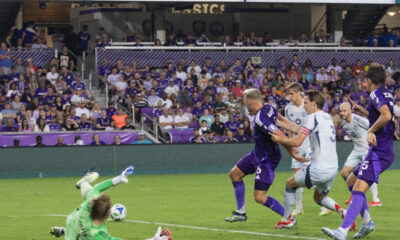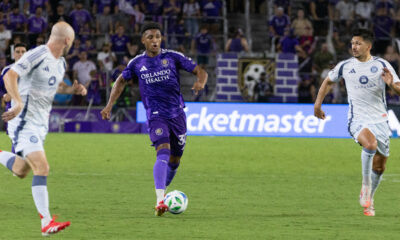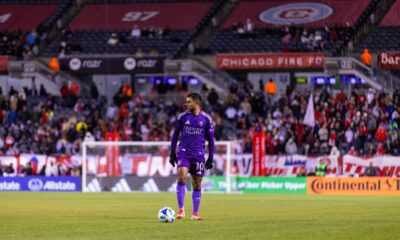Orlando City
Orlando City’s Most Successful Offensive and Defensive Lineups
An analysis of the best offensive and defensive groupings for Orlando City this season across all competitions.
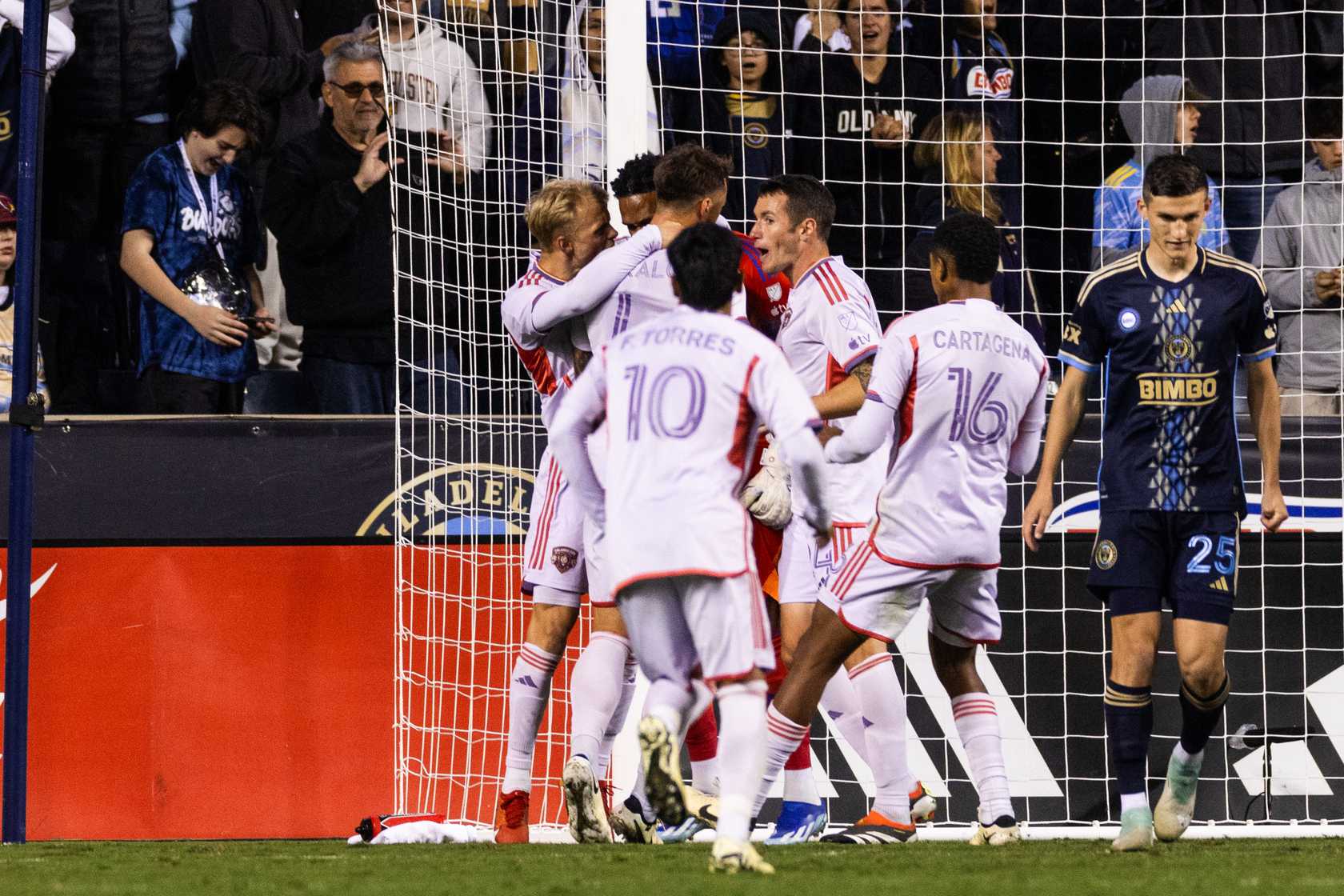
Soccer is a game that has cheer leaders but not cheerleaders, so there is usually no opportunity to hear people chanting out “two, four, six, eight, who do we appreciate?” at soccer matches. In this article, however, we are going to offer some appreciation, and look back at a two, a four, a six and….an 11 that we appreciate.
Let’s start with the two, and take a look at midfield tandem of César Araújo and Wilder Cartagena. Orlando City’s preferred partnership started 23 games alongside one another in all competitions in 2024, and in those games Orlando City went 13-4-6.
| Competition | Wins | Losses | Draws | Points per Game | Goal Differential |
| Concacaf Champions Cup | 1 | 0 | 1 | 2.00 | +3 |
| Leagues Cup | 1 | 0 | 2 | 1.67 | +3 |
| MLS | 11 | 4 | 3 | 2.00 | +13 |
| Total | 13 | 4 | 6 | 1.96 | +19 |
Taking a quick look at the final MLS standings, the 2.00 points per game in MLS play that Orlando City averaged when Araújo and Cartagena started together in the midfield would have ranked only behind Inter Miami’s 2.18 points per game across all 29 MLS teams and was 31% better than Orlando City’s actual final tally of 1.53 points per game (15-12-7). Doing the math, if the Lions were 11-4-3 with Araújo and Cartagena starting together (including six straight wins in their most recent six starts) and 15-12-7 overall, then they must have been 4-8-4 when it was a different starting midfield two, and 4-8-4 is a paltry 1.00 points per game, something closer to a team in the bottom third of the league. Orlando City’s lineup with their top midfield partnership was equivalent to a team on a top-two pace, a one-two punch that was frequently too powerful for an opponent to handle.
Moving on from two to four, let’s take a look at Orlando City’s back lines throughout the season to see which combination of four performed the foremost (ok, I’ll stop) throughout the season. There was a period of time early in the season when the Lions deployed a three-man back line with two wingbacks for a few games, but once they got everyone back from international matches and back to health they have rolled with the four-man back line ever since.
On the season Orlando City has played 41 games (34 in MLS, four in Concacaf Champions Cup, and three in Leagues Cup), so there have been 3,690 total minutes played by defensive groupings so far. Here are the six groupings that played at least 5% of the minutes, and how they have performed this season (own goals scored by Orlando City’s opponents have been excluded, players listed left to right on how they played positionally):
| Back Line | Minutes | % of Minutes | Goals Against | Goals Against per 90 Mins | Goal Differential |
| Santos, Jansson, Schlegel, Thorhallsson | 1,227 | 33.3% | 23 | 1.69 | +1 |
| Smith, Jansson, Brekalo, Thorhallsson | 496 | 13.4% | 9 | 1.63 | +3 |
| Schlegel, Cartagena, Brekalo | 386 | 10.5% | 4 | 0.93 | -3 |
| Smith, Jansson, Schlegel, Thorhallsson | 379 | 10.3% | 7 | 1.66 | +4 |
| Santos, Jansson, Brekalo, Thorhallsson | 367 | 9.9% | 5 | 1.23 | -2 |
| Santos, Jansson, Schlegel, Smith | 262 | 7.1% | 3 | 1.03 | +6 |
Interestingly, the three-man back line of Rodrigo Schlegel, Cartagena, and David Brekalo has the best goals against per 90 minutes rating, giving up less than one goal per game, but the team struggled to score while in this lineup — odd since a three-man back line allows for seven players to play higher up the field, as opposed to only six when in the standard four-man back line. I chalk a lot of this up to it being an unfamiliar formation and one that was played early in the season when the team was trying to figure out how to mix the attacking players together, rather than an issue caused by a three-man back line.
We are focusing on the fours here though, and while the teams preferred back line clearly appears to be Rafael Santos, Robin Jansson, Schlegel, and Dagur Dan Thórhallsson, the data points to two other groupings as ones that played at least 250 minutes together and had better goal differentials. The Santos, Jansson, Schlegel, and Kyle Smith back line did not debut until September, but it was effective against Charlotte (late game), Dallas (starting four), Philadelphia (starting four), and Cincinnati (starting four), and had the second-best goals against per 90 minutes rating of the most used lineups.
The Smith, Jansson, Schlegel, and Thórhallsson back line played together in nine different games — a mix of four starts and five games where they subbed into that grouping. While it was not a grouping that was difficult to break down and score against, as evidenced by the 1.66 goals against per 90 minutes, they were +4 in only 379 minutes together, so the Lions were banging in the goals at a rate of 2.61 goals scored per 90 minutes.
Sometimes the best defense is a good offense, but when we are trying to find the best defensive group of four, we want the best defense to be the best defense, so it looks like it would be either Santos, Jansson, Schlegel, and Smith or Santos, Jansson, Brekalo, and Thórhallsson. Alas, we never saw Santos, Jansson, Brekalo, and Smith together during the season, so there is no data around that grouping, and with Brekalo being seemingly the forgotten man in recent weeks, I do not think we are going to see that lineup in the playoffs either, unless there is an injury or a card situation.
For my four I’m going to go with the data, and while I expect that Thórhallsson will probably start over Smith in the next match, the data says the lineup should read Santos, Jansson, Schlegel, and Smith, with their low goals against and high goal differential.
We will yell out fore and drive our way over to six, and move from the defensive grouping to the offensive one. It is rather amazing how many different offensive combinations have played at least one minute this season. By my count, there were 107 unique offensive groupings that the Lions utilized throughout the 41 games.
While on the defensive side, Orlando City settled into a lineup that ended up playing almost exactly one-third of all minutes, on the offensive side, the most common lineup just barely reached half that number, and the six lineups that played the most together did not even play half of the total minutes available this season (players listed alphabetically, as I could not come up with an easy way to depict the offensive formation in a table).
| Attacking Group | Minutes | % of Minutes | Goals Scored | Goals per 90 Minutes | Goal Differential |
| Angulo, Araujo, Cartagena, Enrique, Ojeda, Torres | 615 | 16.7% | 11 | 1.61 | +7 |
| Angulo, Araujo, Cartagena, McGuire, Ojeda, Torres | 339 | 9.2% | 8 | 2.12 | +3 |
| Angulo, Araujo, Lodeiro, McGuire, Muriel, Ojeda, Torres | 177 | 4.8% | 5 | 2.54 | +3 |
| Angulo, Araujo, Lodeiro, McGuire, Muriel, Torres | 164 | 4.4% | 2 | 1.10 | -1 |
| Angulo, Araujo, Lodeiro, McGuire, Muriel, Torres | 148 | 4.0% | 4 | 2.43 | +1 |
| Angulo, Araujo, Cartagena, Lodeiro, McGuire, Torres | 127 | 3.4% | 1 | 0.71 | +1 |
No other attacking grouping even played one game’s worth of minutes together all season, but I do want to include the statistics from three additional groupings, because as you see here they were prolific, albeit in small samples:
| Attacking Group | Minutes | % of Minutes | Goals Scored | Goals per 90 Minutes | Goal Differential |
| Angulo, Araujo, Cartagena, Enrique, Muriel, Torres | 72 | 2.0% | 3 | 3.75 | +2 |
| Araujo, Cartagena, Enrique, Lodeiro, Ojeda, Torres | 64 | 1.7% | 4 | 5.63 | +4 |
| Angulo, Cartagena, Enrique, Lodeiro, Muriel, Torres | 38 | 1.0% | 3 | 7.11 | +2 |
I do not expect that any of these groupings would actually continue to score at this rate if they played more minutes together, but the two lineups with Araújo and Cartagena seem like lineups that the Lions could use if trailing, and even the bottom row where Nico Lodeiro would be in for Araújo could be possible as well, since Cartagena is generally more of an offensive threat than Araújo if the coaching staff decided to move to one holding midfielder or if they needed to choose one of the two to sub out.
Going back to the commonly used lineups, the question still remains on whether the group of five (Ivan Angulo, Araújo, Cartagena, Martin Ojeda and Facundo Torres) should play more minutes with Ramiro Enrique or Duncan McGuire. The data says they are more efficient with McGuire, to the tune of an additional half a goal per 90 minutes, but most of the McGuire minutes with this group have been played later in the match, when Orlando City was already ahead and the opposition was tired and chasing an equalizer. Enrique’s minutes have nearly all been as a starter since mid-summer, so he generally faces a fresh defense and an even scoreline, so the defenders are not taking as many risks.
Two lineups that are not in either of these tables, because they were each used for only 30 minutes this season, are Araújo, Cartagena, Enrique, Luis Muriel, Ojeda, and Torres and Araújo, Cartagena, Enrique, McGuire, Muriel, and Torres, and they each scored one goal in their time together for a goals-per-90-minutes average of 3.00. Both of those lineups do not contain Angulo, which sacrifices his speed and recovery ability to get back on defense, but they do include every primary creative attacking player except Lodeiro. The samples are too small to be quantitatively confident in their success, but the qualitative side of looking at those names and thinking about how they could line up is one that is exciting to consider with the wealth of attacking talent that they possess.
All of that said, I am going to to cheat a little bit and choose for my six to be Angulo, Araújo, Cartagena, Duncmiro Enriguire, Ojeda, and Torres, a grouping that is +10 for the season in goal differential and averages 1.79 goals scored per 90 minutes while only giving up 0.85 goals scored per 90 minutes. The group with Enrique is better defensively, giving up 0.59 goals per 90 minutes, as compared to 1.33 for the group with McGuire, while the group with McGuire is better offensively, scoring 2.12 goals per 90 minutes, as compared to 1.61 with Enrique.
Alright, so we have our two, our four and our six, and as promised we are going to skip the eight and go to the 11. If we look at the full 11-player lineup that we chose (using Pedro Gallese as the goalkeeper), we had a back line of Santos, Jansson, Schlegel, and Smith; holding midfielders Araújo and Cartagena; attacking midfielders Angulo, Ojeda, and Torres; and Enrique or McGuire at striker. That lineup played together only twice all season, both with Enrique as the striker, and they were +3 during the 110 minutes that they were on the field together, scoring three goals and giving up zero.
It is hard to lose when you give up zero goals, though Orlando City did manage to do so against Cruz Azul (kind of, it was a shootout loss after a draw), but when you average scoring 2.45 goals per 90 minutes and give up 0.00 goals per 90 minutes, that sounds like a winning lineup.
In fact, of all the lineups that played together for more than 75 minutes this season, that lineup does have the best goal differential per 90 minutes. Just as with some of the attacking groupings, there were some lineups that had better goal differentials per 90 minutes in a limited sample size of minutes, but in looking at the groups that played the most minutes, it is the 11-man group from the previous paragraph that performed the best per 90 minutes.
The 11-man lineup that was used the most was Gallese as goalkeeper; a back line of Santos, Jansson, Schlegel, and Thórhallsson; holding midfielders Araújo and Cartagena; attacking midfielders Angulo, Ojeda, and Torres; and Enrique as striker. That group was +7 for the season in nearly 300 minutes together, a goal differential of +2.17 per 90 minutes, which is also Borat-level very nice.
While it was a rough beginning to the season for Orlando City, as the year went on the Lions settled into lineups and rotations that maximized their abilities, as evidenced by their season-ending run of 11-3-3 in all competitions since the calendar turned to July. Óscar Pareja has identified his preferred lineup, and the data and the gut feelings he has around who to play are nearly exactly matched in terms of playing the right players in combination with one another.
Whether it is the two, the four, the six or the 11, Pareja knows who to play, I reckon.
Vamos Orlando!
Orlando City
Orlando City vs. Chicago Fire: Five Takeaways
Here’s what we learned from a disappointing 3-1 home loss against Chicago.
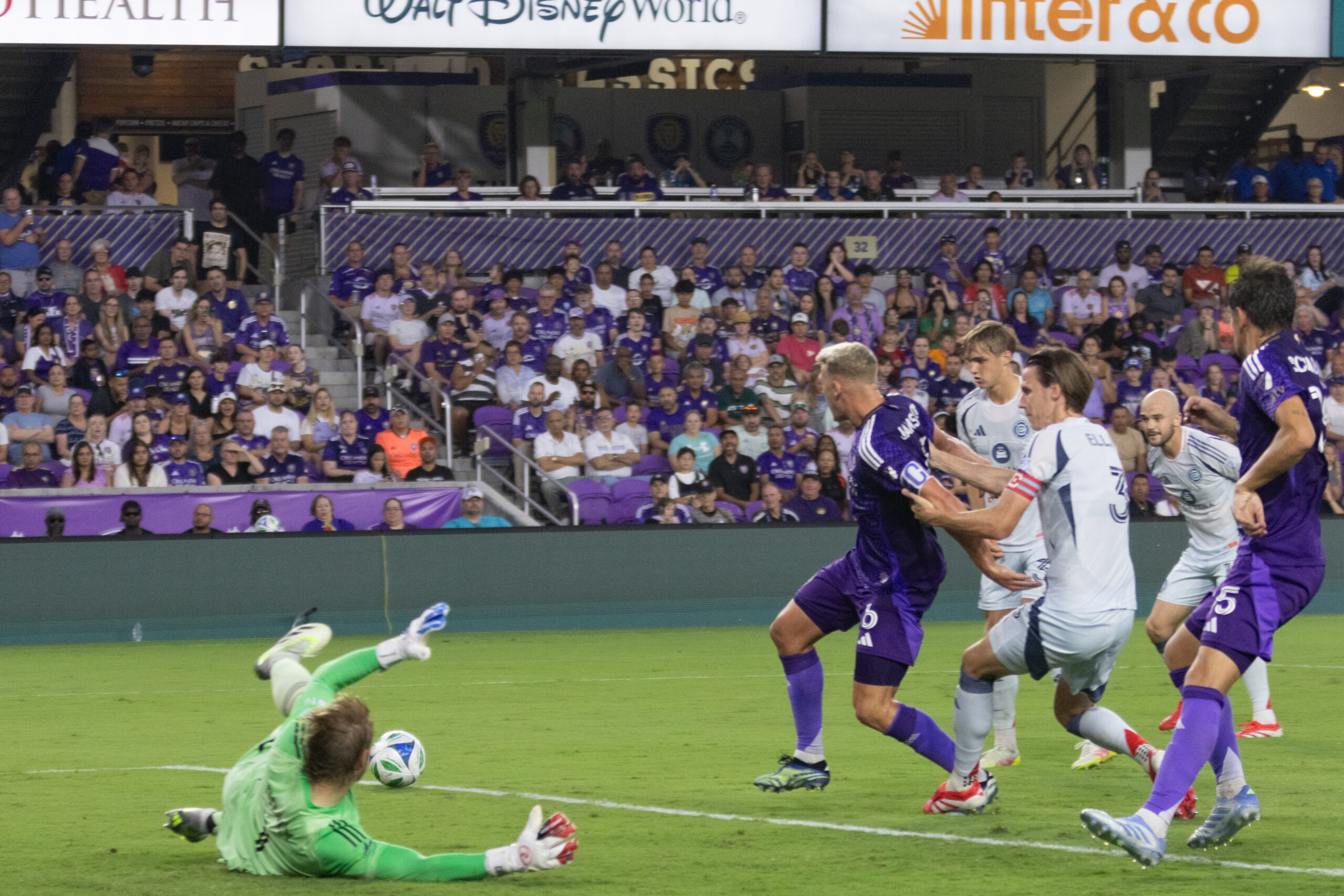
Orlando City won the final 55 minutes of Saturday night’s match 1-0, but unfortunately the Lions were awful in the opening 35 minutes and were already so far down that they could not really mount a real comeback, losing 3-1 to Chicago. After a loss like that, the less painful preamble the better, so let’s get right to it. Here are my five takeaways from Saturday night’s match.
A Gift From Gallese
It was an absolutely brutal start for Orlando City, as the nearly always sure-handed Pedro Gallese made a mess of a routine shot from Philip Zinckernagel, allowing it slip right through his hands and into the back of his net just five minutes into the game. Errors like that one happen to goalkeepers every season (Orlando City benefitted from a similar error by John McCarthy of the LA Galaxy back in March), but this one was especially crushing, as it happened right in the opening minutes of the game, giving Chicago an undeserved boost of confidence and removing the opportunity for the Lions to take an immediate lead and wash the bad taste of the collapse at Atlanta from their mouths. Zinckernagel was far too easily able to turn and get his shot off, one of many defensive miscues during the opening minutes of the game, but the shot he took was right at Gallese and El Pulpo probably saves that 99.9% of the time. Unfortunately, Saturday night’s shot was the one in one thousand that went right through his hands like butter.
Back To Back Breakdowns
Teams are often at their most vulnerable right after scoring a goal, as the euphoria of scoring a goal often leads to a dip in focus for the team that just scored, while the anger of allowing a goal brings on a surge of adrenaline for the team that was just scored upon, and they play with a serious sense of urgency in the immediate aftermath. This was not the case in any way, shape or form for Orlando City after allowing Chicago’s second goal, as the Lions gave the ball away almost instantly on the kickoff and then looked completely out of sorts as Chicago just blew right through the middle of the field and got the ball to Hugo Cuypers with no trouble at all. Cuypers then made Rodrigo Schlegel no trouble of his at all and scored his second goal within two minutes on a well-placed shot past Gallese. Chicago’s second goal came on a complete defensive breakdown as well, with Cuypers somehow unmarked in between three defenders right in front of the goalmouth, and for Chicago to then get a third goal right after that left many in the stadium stunned. Even though there was still almost an hour left to play, the game seemed almost over already with how poorly the entire defensive unit was playing.
Lots of Chances, One Conversion
Orlando City took 28 shots, pumped in 22 crosses, earned 13 corner kicks, and — according to Opta’s tracking — created two “big chances.” And yet, after all that, all the Lions had to show for it was a goal on a header from right back Alex Freeman, which was not one of their two big chances. I wrote last week about Orlando City’s nearly league-worst poor finishing on big chances and how I thought a positive regression to the mean might be coming, but what if it does not? Games like Saturday night’s show that it might not be bad luck. It might be that this team lacks a scorer who can find a way to convert even a league-average amount of those big opportunities. If that is the case, then the team will have to rely on scoring in other ways, and as the team is among the league leaders in goals scored, the Lions may be able to continue to score via more difficult opportunities, but they were unable to do so on Saturday night as Chicago goalkeeper Chris Brady was rarely troubled enough to get his shorts into a Brady bunch.
I’ll see myself out.
Lack Of Legs
May is finally over, and thus ends a punishing month for Orlando City with the club playing nine games between May 3 and May 31. It may not have been Óscar Pareja on the sidelines, but I am sure he selected the starting group, and it contained nine of the 11 players who started Wednesday night in Atlanta and seven players who started against Atlanta and against Portland the prior Saturday. The team just looked gassed throughout the match, and while Orlando dominated possession during the second half and took all the shots and made the crosses I mentioned in the prior takeaway, the team did not look locked in while doing so, with uncharacteristic misses happening from many different players. The four substitutes who came on all looked noticeably fresher and more energetic than their teammates, and perhaps more rotation from the starting group in this match, or in prior matches, might have led to a different result.
Freeman An Attacking Force
I want to end with a positive, and whether the ball deflected in off a defender or not, Freeman scored his fourth goal of the season, making him the first Orlando City defender to score four goals in an MLS season, and the season only just reached the halfway point. According to whoscored.com, Freeman’s average position on Saturday night was higher on the field (i.e. closer to the opposing goal) than every Orlando City starter except fellow right side player Marco Pašalić and Luis Muriel, and Orlando City made 39% of its attacks down that right side, looking to take advantage of the Freeman and Pašalić combination. Freeman’s goal was from a corner kick, so none of those right-side heavy attacks amounted to a goal, but Freeman was engaged and involved throughout and continued to show that he is one of the league’s best offensive threats at the right back position.
Those are my takeaways from Orlando City’s rough performance against Chicago. The team will now have a well-deserved two-week break before heading out on the road to Colorado on June 14. Hopefully the Lions will come out recharged and ready to start a new winning streak when that game kicks off against the Rapids.
Let us know your thoughts about the Chicago match in the comments below. Vamos Orlando!
Orlando City
Orlando City vs. Chicago Fire: Final Score 3-1 as Dreadful Defending Dooms Lions
A brutal first half sent the Lions to their second straight loss and just their second home defeat of the season.
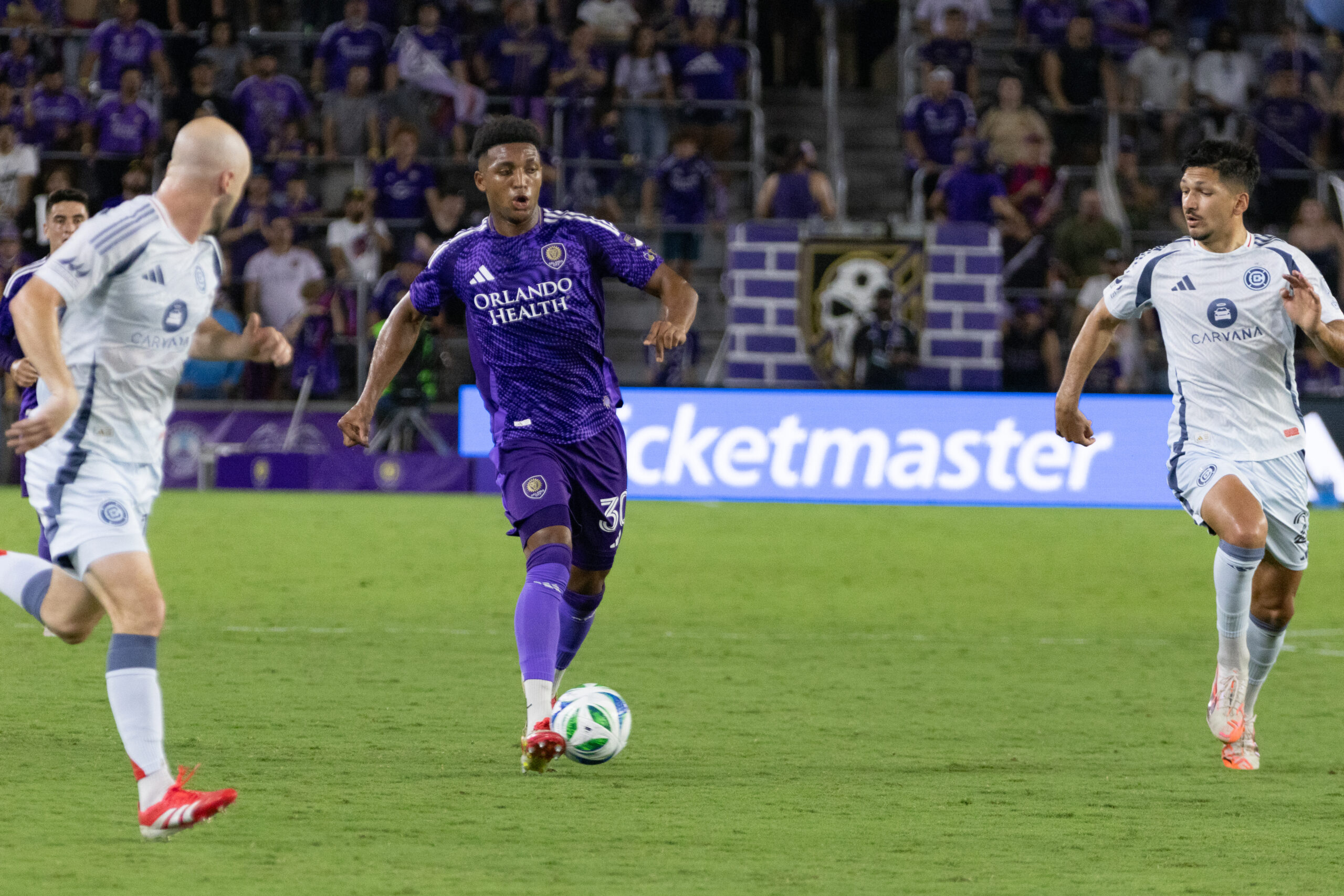
Orlando City played a terrible first half and could not recover in a 3-1 loss to the Chicago Fire at Inter&Co Stadium. After 12 games without a loss, the Lions (7-4-6, 27 points) fell for the second straight game and just the second time at home all season. Chicago (6-5-4, 22 points) didn’t have to work terribly hard for its goals on this night as the first one went through Pedro Gallese’s hands, and the other two were wide-open looks for Fire leading scorer Hugo Cuypers, who finished both with no trouble.
After falling behind 3-0 in the first half, Alex Freeman got the Lions on the board, but other than that there was no final product on 28 other shot attempts, with only five others sent on target.
The Lions played this match without Head Coach Oscar Pareja, who was sent off in Atlanta Wednesday and had his appeal denied. Pareja served his suspension in this match, leaving his first assistant in charge on the touchline.
“The game, I think we lost in one minute,” Orlando City Assistant Coach Diego Torres said after the match. “In one minute we received two goals. But the energy with the players is amazing.”
Torres’ lineup included Gallese in goal behind the usual back line of David Brekalo, Robin Jansson, Rodrigo Schlegel, and Freeman. With Cesar Araujo suspended, Joran Gerbet joined Eduard Atuesta in central midfield with attacking midfielders Ivan Angulo and Marco Pasalic. Martin Ojeda and Luis Muriel operated up top as the forwards.
Orlando looked every inch the team playing on short rest against Chicago, which had full rest after not having a midweek game. The Lions were lethargic early and dug a deep hole in the first half with poor attention to detail in defending the final third. The opening goal was a terrible one for Gallese to concede, and the back line did far too little to prevent two more that the visitors tacked on to build a cushion.
The Lions never quit trying to fight their way back into the match, but the hole was far too deep for a shattered group trying to break down a defensively organized team protecting a lead. Had Orlando been able to find a second goal to put pressure on the Fire, the hill might not have proven too difficult to climb, but as it was, Chicago didn’t have to take any real risks after the 32nd minute of the game.
The Fire scored on the first shot of the match, but it wasn’t a great shot, and it was a goal that Gallese will want back, because it was right down the middle and he made a mess of it. Philip Zinckernagel’s drive from outside the box was above Gallese, who let it slip right through his hands and in for the worst goal conceded this season. Zinckernagel hardly celebrated, knowing he’d caught a huge break. The Fire led 1-0 just five minutes into the game and the air went out of the stadium.
“It’s normal (to make) one mistake, one player, but when it’s the goalkeeper, it’s more hard,” Torres said.
Orlando finally attempted a shot in the 16th minute when Angulo cut left to right outside the area, but the Colombian sent his floater well over the target.
The Fire nearly doubled their lead a minute later. Chicago cycled the ball right to left to Jonathan Bamba. Gerbet was slow to close down and Bamba’s shot from the left didn’t miss the right post by much.
Ojeda found some space for Orlando’s first truly dangerous opportunity in the 21st minute. Finding an opening, Ojeda blasted a shot from about 25 yards out. Fire goalkeeper Chris Brady fought it off with an important save.
The Lions tried to get back in the game and held a bit of possession, forcing Chicago into a couple of bookings. Muriel fired wide off a good play by Atuesta to bring the attack into the box in the 29th minute.
Two minutes later, Cuypers doubled the lead. Zinckernagel sent a cross in front to a wide-open Cuypers who had drifted away from Schlegel. The Argentine was caught ball watching as the Fire’s leading scorer pushed the game to 2-0 in the 31st minute.
The restless crowd was still grumbling about the second goal when Cuypers made it 3-0 less than a minute later. Schlegel seemed to take too long to recognize the danger, and when the Argentine tried to recover, Cuypers roasted him to get inside alone and fired home.
“Distractions. But the responsibility is mine, because the defender is discoordinated in these two situations,” Torres said of the breakdowns that led to the two Cuypers goals.
To their credit, the Lions kept fighting to get back into the game, winning a series of corners. Orlando made one pay off with Ojeda sending in a good ball for Freeman in the 40th minute. The young fullback didn’t get a lot of power on his header, but it deflected off of Romingue Kouame to catch Brady wrong-footed. Freeman’s fourth goal of the year made it 3-1.
“I think we went over that set piece a lot during training in the past week,” Freeman said. “It was just me and Rodri (Schlegel) trying to decide who goes first and goes second. Tincho played a wonderful ball and Rodri kind of blocked the guy for me, and then I kind of just headed it and got a little deflection, and it went in. Obviously I was hoping that was going to be the way that we (could) come back.”
Orlando had a couple of shouts for a penalty late, but there wasn’t anything in them. However, Pasalic had a good opportunity to make it 3-2 in the 44th minute on a great hustle play from Angulo, who tracked deep into his own end to defend and then blasted down the field to keep a ball in play at the end line, backheeling it to Muriel, who dropped it to Pasalic. The Croatian had space but sizzled his shot just over the bar.
Neither side did much in more than five minutes of stoppage time and Orlando was looking up at a two-goal deficit at the break.
Possession was split right down the middle in the first half. Orlando City held the advantage in shots (16-6), corners (5-0), and passing accuracy (88.6%-84%). Chicago put more shots on target (4-3).
“We came out too slow, and I feel like as a team, we wanted to start better and perform better,” Freeman said. “But in the second half, we kind of got our stuff together, but we weren’t able to get the goals that we wanted, and we ended up losing.”
Ramiro Enrique subbed on for Angulo at the break, although Muriel looked the most leggy of the Orlando attackers on this night.
The Lions were fortunate that a wayward pass from the right didn’t find two free Fire runners in the box shortly after the restart or it surely would have been 4-1 just moments after the restart.
The Lions continued to win corners early in the second half. The ball fell in the midst of all the bodies a couple of times but Orlando couldn’t find the handle. The closest the Lions came to finding a finish was a Brekalo shot that was blocked out front in the 51st minute. A minute later, Pasalic fired from outside the area on a recycle but Brady tipped the dipping effort over the bar. Pasalic fired again in the 55th minute from the right side, sending his shot through traffic but just wide of the left post.
Chicago nearly put the game to rest in the 57th minute when Andrew Gutman fired off the left post. The rebound came out of the box to Bamba, who fired well over the bar.
The Fire handed Orlando a dangerous free kick in the 58th minute by fouling Ojeda just outside the area on the left. Muriel took the set piece but hit the wall and popped up for Brady to gather.
Enrique’s first sight of goal came in the 62nd minute, but he had to regather after Christopher Cupps put a foot in. By the time Enrique fired, Brady was in position and made a good save from point-blank range. Three minutes later, the Lions came within inches of pulling to within a goal when Muriel fired from outside the box, crashing his effort off the crossbar in the 65th minute.
Orlando kept coming but could not find the quality on the last touch. Freeman headed over the bar in the 70th minute on the recycle of a set piece. Enrique then tried to stab home a great ball from Muriel in the 75th minute, but Brady made a terrific save. Two minutes later, Muriel tried to head it toward the back post on a set piece but it skipped wide. Enrique then got under a header in the 79th as the missed opportunities continued.
There were no major chances for Orlando after that, although second-half sub Dagur Dan Thorhallsson made a terrific effort to steal the ball and start an attack in the fourth minute of stoppage time. In a microcosm of the night, Enrique finished the play by firing over the bar and was offside on the play anyway.
The Lions were spared further blushes deep in stoppage time when Maren Haile-Selassie missed wide of the right post in transition when the Lions were caught out. The whistle finally put a mercy killing to the proceedings and the Lions were deservedly on the wrong side of the scoreline.
Orlando City finished with the advantage in possession (54.5%-45.5%), shots (29-10), shots on target (6-4), corners (13-1), and passing accuracy (89%-83.5%).
“I feel like after the game, we were all quiet. I mean, it’s not how we wanted to go to the break,” Freeman said. “I mean, it’s our home turf. This is where we’re supposed to win. We’re supposed to win for our fans, so I think that after the game all of us were disappointed in ourselves, but I think everybody shouldn’t be disappointed, we should be happy what we’ve done in the past month.”
“We had many chances. It was tough. The goalie made many good saves,” Enrique said. “We gave it our all, but at the end of the day, we leave disappointed with that result.”
The Lions finally get to rest, as Orlando City will not play again until June 14 at the Colorado Rapids.
Orlando City
Orlando City vs. Chicago Fire: Preview, How to Watch, TV Info, Live Stream, Lineups, Match Thread, and More
The Lions return home looking to bounce back from throwing points away late in Atlanta in the midweek.
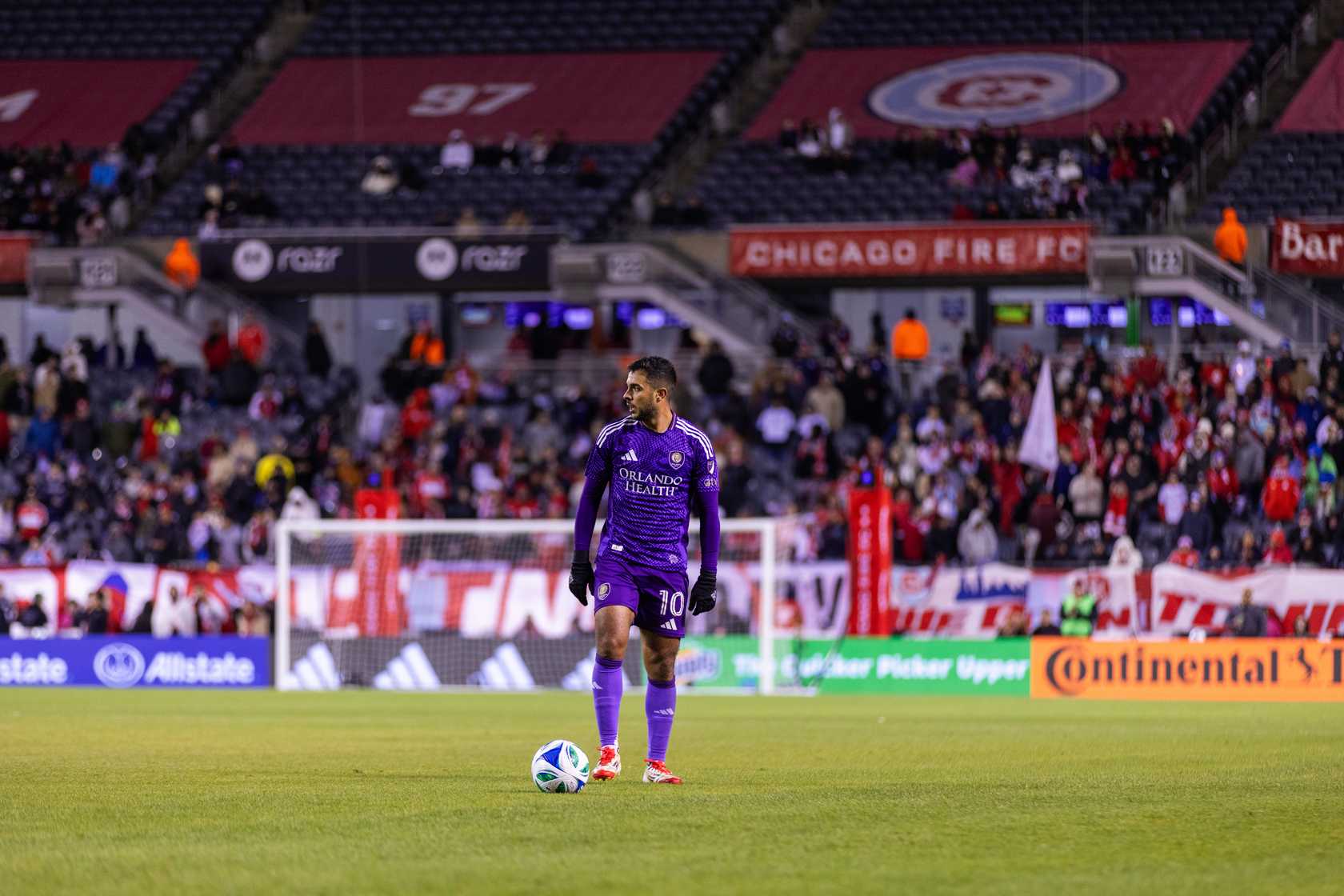
Welcome to your match thread and preview for a Saturday night matchup between Orlando City (7-3-6, 27 points) and the Chicago Fire (5-5-4, 19 points) at Inter&Co Stadium (7:30 p.m., MLS Season Pass on Apple TV). This is the second and final scheduled meeting between the Eastern Conference rivals in 2025, closing the season series.
Here’s what you need to know about the match.
History
The Lions are 8-5-8 in 21 MLS meetings with the Fire and 8-6-8 in all competitions. Orlando City is 5-2-3 against the Fire at home in the regular season. The teams met 28 days ago, kicking off a busy May against each other at Soldier Field on May 3. Despite Fire goalkeeper Chris Brady getting sent off before halftime for fouling Duncan McGuire and denying him a goal-scoring opportunity, the teams played to a 0-0 draw, as Orlando City simply couldn’t find any precision in front of goal.
These two teams last met in Orlando on June 22, 2024, with the Lions capturing a 4-2 home victory. Facundo Torres scored a brace, with Luis Muriel (from the penalty spot) and Ivan Angulo adding goals to offset a penalty by Maren Haile-Selassie (after a Rodrigo Schlegel handball in the box) and Hugo Cuypers.
The two sides clashed at Soldier Field just a few weeks prior to that on May 29, playing to a 1-1 draw. Torres opened the scoring early with a scrappy goal in traffic, and the Lions should have had a penalty late in the first half when Angulo was clipped while in alone on a goal after rounding the goalkeeper, but the video assistant referee did not overturn the no-call on the field, and referee Malik Badawi did not look at the play himself. The Fire tied the match in the final 20 minutes on a Cuypers goal.
The Lions swept the two-game season series in 2023 by identical 3-1 scorelines. On Aug. 21, Orlando City got goals from Wilder Cartagena, Angulo, and Torres (from the penalty spot) to overcome a 1-0 deficit supplied by Mauricio Pineda, winning 3-1 on the road.
When the teams met in Orlando, the Lions rode a Torres brace to a 3-1 win on July 1. Xherdan Shaqiri pulled a goal back from the penalty spot after a Kyle Smith foul in the box against Brian Gutierrez, but Ramiro Enrique added an insurance goal.
Orlando City claimed a 1-0 victory at Exploria Stadium on April 9, 2022 on Ercan Kara’s first MLS goal. The two sides met at Soldier Field just over a month prior to that match and played, officially, to a 0-0 draw on March 5. The game is another Orlando City match that will live in infamy due to the Professional Referee Organization’s statement after the game that Junior Urso’s goal should not have been overturned upon video review by Ismir Pekmic due to Kara not having clearly and obviously handled the ball in the buildup in any of the available replay angles. Alas…
The teams met in Orlando on Aug. 21, 2021, with a second-half Benji Michel strike lifting the Lions to a 1-0 victory. Tesho Akindele set up the play by forcing a turnover. In that year’s meeting at Soldier Field, the Fire got the better of the Lions to the tune of 3-1 on July 7. Andres Perea scored his first career MLS goal to open the scoring, but a defensive lapse in first-half stoppage allowed Boris Sekulic to equalize just before the break. Chicago rode that momentum, adding goals by Robert Beric and Chinonso Offor.
The Lions were 0-4-4 in the eight meetings before smashing the Fire 4-1 in Orlando on Sept. 19, 2020. Orlando City withstood two Chicago penalties and saw two Fire goals overturned by video review in that rain-soaked match. (Weird things usually happen when Chicago visits Orlando.) The Lions got goals from Chris Mueller, Nani, Urso, and Michel, while Chicago had only a Beric penalty to show for an otherwise good offensive performance.
The last meeting of 2019 was the last time the Fire won on the road in the series. It was a debacle for the Lions, who lost defender Robin Jansson to a back/neck injury early and shipped a handful of goals in a 5-2 home loss in the regular-season finale. Orlando got goals from Akindele and Michel but largely played like a team that couldn’t wait to end its season. Chicago got an own goal from Orlando’s Smith and strikes from CJ Sapong, Aleksandar Katai, and Przemyslaw Frankowski (twice) in the rout.
Orlando City was seconds away from a road win on March 9, 2019 before Sapong’s free header in the 95th minute leveled things in a 1-1 draw in Chicago. Dom Dwyer scored Orlando’s goal.
In 2018, the Fire swept the season series. Orlando fell 2-1 at home on May 26, 2018, with Alan Gordon’s wondergoal breaking a 1-1 deadlock. The return leg in Chicago that September was an abysmal performance by Orlando in a 4-0 Fire victory.
Chicago went 1-0-1 in 2017, with the teams playing to a 0-0 draw on June 4, 2017, with the Lions reduced to nine men. The previous 2017 meeting was the Fire’s 4-0 beatdown of Orlando on June 24 of that year. David Accam figured in all four goals, with a hat trick and an assist on Nemanja Nikolić’s goal.
The teams split the points in 2016, drawing both meetings. Cyle Larin and Accam traded goals in a 1-1 draw in Orlando on March 11. The Fire again came from behind to draw, 2-2 in the return leg that August.
The teams met once in Orlando in 2015, with the Lions and Fire battling to a 1-1 draw. You may recall that five-hour, weather-delayed affair with Eric Gehrig’s own-goal canceling out an Accam strike. The other three meetings came in Chicago, with City winning 3-2 and 1-0 in MLS matches and falling 3-1 in U.S. Open Cup quarterfinal action.
Overview
The Lions are coming off a brutal 3-2 come-from-ahead loss at Atlanta United on Wednesday. City led 2-1 with less than a quarter of an hour to play on goals by Cesar Araujo and Enrique, when the former lost his cool and put his hand on the neck of Mateusz Klich, who had shoved him down from behind after the whistle. Araujo was immediately sent off and Klich, who should already have been on a yellow card earlier in the match, was cautioned. Atlanta used the man advantage to turn the game around, snapping the Lions’ 12-game unbeaten run.
Orlando City is 5-1-2 at home in 2025, and will need to play tonight’s match without Araujo, as well as without Oscar Pareja, who was sent off after Atlanta tied the game for leaving his penalty area. The club appealed his red card but the appeal was denied, so the head coach will not be on the touchline for tonight’s match.
Chicago has lost its last two matches in the regular season, and the Fire are playing their fourth of five consecutive matches on the road in all competitions. The last match was a 3-1 loss to New York City FC at Yankee Stadium, with the Fire seeing two men sent off, although only one of them — Gutierrez — will miss tonight’s match after Dje D’Avilla’s appeal for his second yellow card was upheld and the suspension overturned. Chicago brings a respectable 4-4-0 road record into the proceedings tonight.
Beating Chicago means trying to contain Cuypers, who paces the Fire with eight goals to go along with two assists. Midfielders Jonathan Bamba and Philip Zinckernagel both looked dynamic in the first meeting before Bamba was sacrificed for the backup goalkeeper after Brady’s red card. Zinckernagel has five goals and four assists on the season, with Bamba chipping in two goals and six assists. Orlando City will need to maintain its recent defensive form — at least when playing with 11 men — to return to the win column and close out the month strong.
“We know that Chicago Fire’s attack is very dangerous. [Hugo] Cuypers is near the top of the league in scoring, [Jonathan] Bamba is really fast, and [Philip] Zinckernagel is good on the ball,” said Orlando City Assistant Coach Diego Torres ahead of the match. “They have more players who can play the number 10 or in the midfield. Other teams have found the focus defensively when Chicago has the ball, and that’s the same for us. Their movement and tactics are very interesting, and we worked with the players to let them know that these are their tactics. Gregg [Berhalter] is a good coach in this situation [with the ball], but he’s also prepared without the ball. Their defending has a good shape and creates good ball recovery. Chicago is dangerous and playing very well without the ball in this moment. We have to be creative to score more goals than Chicago. If we have a clean sheet again, it will be even better.”
Torres will coach the team in Pareja’s absence.
The Lions will be without Araujo (suspension), Nico Rodriguez (thigh), Wilder Cartagena (Achilles), and Yutaro Tsukada (knee), while Gustavo Caraballo (lower leg) and Duncan McGuire (upper extremity) are listed as questionable.
In addition to Gutierrez, Chicago will be without Sam Rogers (torso), David Poreba (lower body), and Carlos Terán (lower body). Additionally, former Lion Chris Mueller has been away from the team for non-injury reasons following the birth of his second child. Chase Gasper (lower body) and Mauricio Pineda (lower body) are questionable.
Match Content
- The most recent epsiode of the PawedCast includes our key matchups and score predictions for tonight’s match.
- Our David Rohe provided his three keys to an Orlando City victory in tonight’s match.
Official Lineups
Orlando City (4-4-2)
Goalkeeper: Pedro Gallese.
Defenders: David Brekalo, Robin Jansson, Rodrigo Schlegel, Alex Freeman.
Midfielders: Ivan Angulo, Joran Gerbet, Eduard Atuesta, Marco Pasalic.
Forwards: Martin Ojeda, Luis Muriel.
Bench: Javier Otero, Rafael Santos, Zakaria Taifi, Kyle Smith, Thomas Williams, Dagur Dan Thorhallsson, Gustavo Caraballo, Shak Mohammed, Ramiro Enrique.
Chicago Fire (4-3-3)
Goalkeeper: Chris Brady.
Defenders: Andrew Gutman, Jack Elliott, Christopher Cupps, Jonathan Dean.
Midfielders: Mauricio Pineda, Rominigue Kouame, Sergio Oregel.
Forwards: Jonathan Bamba, Hugo Cuypers, Philip Zinckernagel.
Bench: Jeff Gal, Omar Gonzalez, Kellyn Acosta, Maren Haile-Selassie, Leonardo Barroso, Sam Williams, Dje D’Avilla, Tom Barlow, Omari Glasgow.
Referees
Ref: Ricardo Fierro.
AR1: Ian McKay.
AR2: Ben Pilgrim.
4th: Joshua Encarnacion.
VAR: Shawn Tehini.
AVAR: Craig Lowry.
How to Watch
Match Time: 7:30 p.m.
Venue: Inter&Co Stadium — Orlando.
TV/Streaming: MLS Season Pass on Apple TV.
Radio: AM 810 FOX Sports Radio Orlando (English), Mega 97.1 FM (Spanish).
Social Media: For rapid reaction and live updates, follow us on Bluesky Social at @themaneland.bsky.social or follow Orlando City’s official Twitter (@OrlandoCitySC) or Bluesky (@OrlandoCitySC) feed.
Enjoy the game. Go City!
-
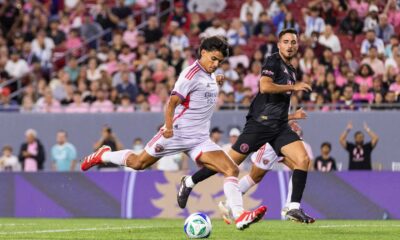
 Orlando City2 weeks ago
Orlando City2 weeks agoOrlando City SC vs. Inter Miami: Preview, How to Watch, TV Info, Live Stream, Lineups, Match Thread, and More
-
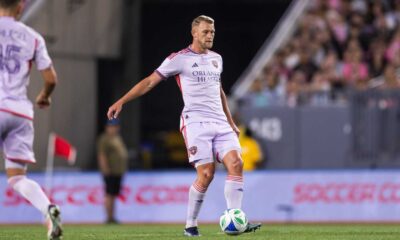
 Orlando City1 week ago
Orlando City1 week agoOrlando City vs. Portland Timbers: Preview, How to Watch, TV Info, Live Stream, Lineups, Match Thread, and More
-
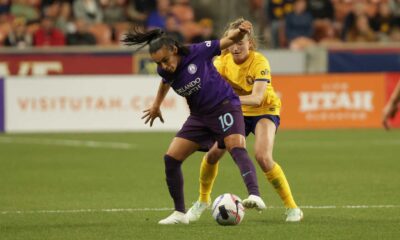
 Orlando Pride1 week ago
Orlando Pride1 week agoOrlando Pride vs. Utah Royals: Preview, How to Watch, TV Info, Live Stream, Lineups, Match Thread, and More
-
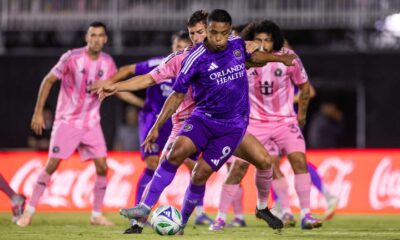
 Orlando City2 weeks ago
Orlando City2 weeks agoOrlando City vs. Inter Miami: Final Score 3-0 as Lions Romp in South Florida
-

 Orlando City1 week ago
Orlando City1 week agoOrlando City vs. Nashville SC: Five Takeaways
-
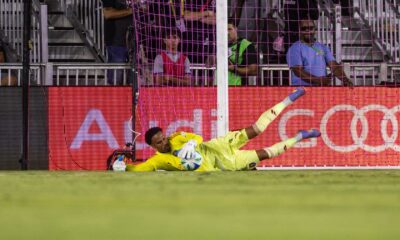
 Orlando City2 weeks ago
Orlando City2 weeks agoOrlando City vs. Inter Miami CF: Player Grades and Man of the Match
-
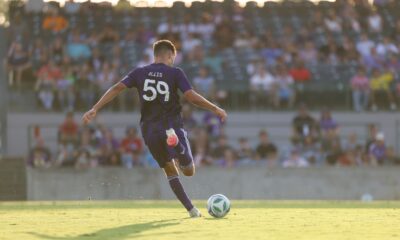
 Orlando City B2 weeks ago
Orlando City B2 weeks agoOrlando City B vs. Inter Miami II: Final Score 3-0 as Young Lions Dominate Herons At Home
-
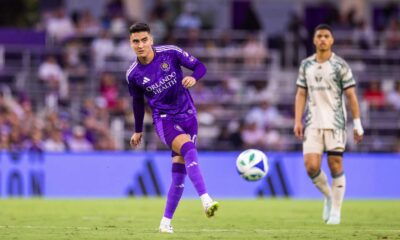
 Orlando City1 week ago
Orlando City1 week agoOrlando City vs. Portland Timbers: Final Score 1-0 as Lions Tie Club-Record 12-Game Unbeaten Streak


